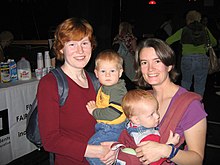Same-sex adoption: Difference between revisions
Adoption of children by members of the same sex
Same-sex adoption is the adoption of children by same-sex couples. It may take the form of a joint adoption by the couple, or of the adoption by one partner of the other’s biological child (stepchild adoption).
Joint adoption by same-sex couples is permitted in 35 countries, most of the countries and territories that allow same-sex marriage, as well as in several countries and dependent territories that do not: namely Croatia, Israel, Liechtenstein, Bermuda and the Cayman Islands. (In some of the countries with marriage, legislation for adoption preceded that for marriage.)
Adoption is only permitted for same sex married couples in 21 of the 31 Mexican states and Mexico City, despite a Supreme Court ruling that requires states to allow it. Stepchild adoption is permitted for same-sex couples in a couple additional countries without same-sex marriage, namely Estonia and San Marino.
Given that constitutions and statutes usually do not address the adoption rights of LGBT persons, judicial decisions often determine whether they can serve as parents either individually or as couples. Opponents of adoption by same-sex couples have argued that LGBT parenting adversely affects children. However, research consistently shows that gay and lesbian parents are as fit and capable as heterosexual parents, and their children are as psychologically healthy and well-adjusted as those reared by heterosexual parents.[1][2][3]
Same-sex parents pursuing adoption must also contend with social pressures to conform to heteronormative gender roles.[4] The concept of gender role models is necessitated by the bureaucratic organization of foster care and adoption agencies, particularly in the United States.[5]
LGBT parenting[edit]
The existing body of research on outcomes for children with LGBT parents includes limited studies that consider the specific case of adoption. Moreover, where studies do mention adoption they often fail to distinguish between outcomes for unrelated children versus those in their original family or step-families, causing research on the more general case of LGBT parenting to be used to counter the claims of LGBT-adoption opponents.[6] One study has addressed the question directly, evaluating the outcomes of adoptees less than 3-years old who had been placed in one of 56 lesbian and gay households since infancy. Despite the small sample, and the fact that the children have yet to become aware of their adoption status or the dynamics of gender development, the study found no significant associations between parental sexual orientation and child adjustment.[4]
Scientific research indicates that the children of same-sex couples fare just as well as the children of opposite-sex couples.[7]
In 1979, Reverend John Kuiper of the Metropolitan Community Church and his husband became the first gay men in America to win the right to adopt a child.[5][8]
Arguments[edit]
The adoption of children by LGBT people is an issue of active debate. In the United States, for example, legislation to prevent adoption by LGBT people has been introduced in many jurisdictions; such efforts have largely been defeated. Prior to 1973, state courts commonly barred gay and lesbian individuals from holding a parenting role, especially through adoption.[9]
Major professional organizations have made statements in defense of adoption by same-sex couples. The American Psychological Association has supported adoption by same-sex couples, citing social prejudice as harming the psychological health of lesbians and gays while noting there is no evidence that their parenting causes harm.[10][11][12][13] The American Medical Association has issued a similar position supporting second parent adoption by same-sex partner, stating that lack of formal recognition can cause health-care disparities for children of same-sex parents.[14]
The following arguments are made in support of adoption by LGBT parents:
- The right of a child to have a family, guardians or people who can take care of their wellbeing.[15]
- Human rights – child’s and parent’s right to have a family life.[16][17]
- There are almost no differences between children raised by same-sex or straight couples.[18][19][20] For that reason, sexual orientation of the parents has almost no relevance when it comes to raising a child[21]
- Evidence confirming that, despite the claims of those opposed to LGBT+ parenting,[22] same-sex couples can provide good conditions to raise a child[23][24][25]
- For the children, adoption is a better alternative to orphanage[26][27][28][29][30][excessive citations]
- Less formalities for step-parents in everyday life, as well as the situation of a death of a biological parent of a child[31][32]
The following arguments are made against adoption by LGBT parents:
- Many adoption agencies are faith-based – it may go against their religion to support LGBTQ+ parents.[33]
- Children need…


